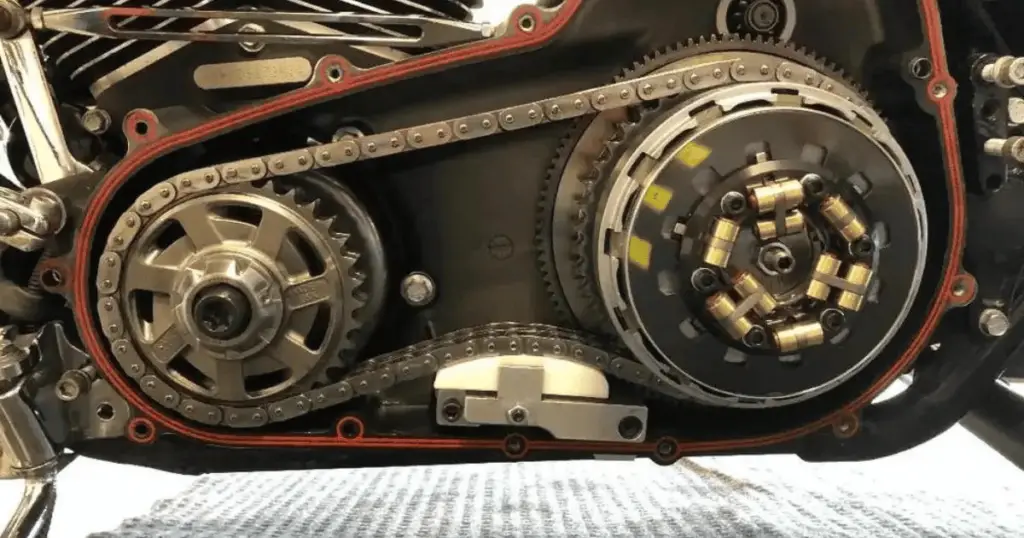As a Harley enthusiast like myself, you may have chosen your bike for its distinctive rumble and the sense of freedom it offers on the open road. Your Harley’s compensator plays a key role in your ride’s overall performance, smoothness, and reliability – if you didn’t know. It’s an essential component of the motorcycle’s primary drive system, responsible for absorbing the engine’s torque fluctuations to prevent damage to the gearbox and provide a smoother ride. Recognizing the early warning signs of a failing compensator can save you from a rough ride, and potentially expensive repairs. So what do you need to know, and when should you be concerned?
Symptoms of a bad compensator might reveal themselves during the simplest of actions, like starting your bike or when you’re just idling. You may hear unsettling noises, such as clunking or rattling, which are not to be ignored. Difficulty in shifting, jerky acceleration, or an overall drop in engine performance are clear indicators that your Harley’s compensator requires attention. Being aware of these signs is the first step in diagnosing and addressing the issue before your riding experience is compromised.
Related read: 3 Harley Davidson Transmission Problems That Shift Your Mood
Understanding the Harley Compensator

The Harley compensator, a crucial component of your Harley-Davidson’s engine, plays a pivotal role in managing engine torque. Its main job is to smooth out the power delivery from the engine to the drivetrain. This nifty device enables a more comfortable ride by easing the shock to your motorcycle’s transmission and drive system during acceleration and deceleration.
How Does the Compensator Work on a Harley?
Imagine the compensator as a mediator between the engine and the rest of your bike. When your Harley’s engine cranks out power, it doesn’t do so evenly. Instead, the engine delivers power in pulses, which if unchecked, can lead to a rough ride. The compensator steps in to absorb these pulses of torque, ensuring a smoother transition of power.
Here’s a breakdown of the compensator’s action:
- Absorption of Shock: During engine pulsations.
- Reduction of Stress: On the motorcycle’s transmission and drive belt or chain.
- Improved Ride Quality: Through smoother power output.
The compensator consists of a series of springs and moving parts that absorb the engine’s torque spikes. As you ride your Harley Davidson, the compensator helps in dealing with stress caused by the engine’s power delivery, effectively increasing the lifespan of the motorcycle’s components and enhancing ride quality.
Remember, if you notice odd noises, starting issues, or difficulty shifting gears, these could be signs of a Harley compensator needing attention. Regular checks and maintenance are key to ensuring the compensator functions properly, giving you the smooth ride you love.
Fed up with the problems and looking for a reasonable solution? Why not get some performance gains in the process with the Darkhorse Man O’War Compensator Sprocket?
Most Common Bad Harley Compensator Symptoms
When your Harley’s compensator starts failing, it’s crucial to recognize the signs so you can address them promptly. Here are the specific symptoms that you should look out for, each a potential red flag indicating compensator issues.
Strange Noises
Your motorcycle’s sounds can tell you a lot about its health. If you hear a clunking noise during startup, that’s a classic bad compensator sound. Additionally, an internal sprocket noise or a clattering sound might also be audible, which should not be ignored. These sounds are more than just annoyances; they’re a signal that the compensator may need attention.
- Clunking noise on startup
- Clattering sound resembling marbles in the primary case
Starting and Stuttering Issues
A failing compensator can lead to starting problems. You may experience difficulty starting, or the engine may misfire when you attempt to turn it on. Stuttering or frequent kickbacks during ignition are also telltale signs of a bad compensator. These symptoms can affect both your riding experience and your motorcycle’s performance.
- Misfiring or difficulty when starting the engine
- Stuttering and frequent kickbacks during ignition phase
Vibrations and Stability Concerns
Another sign is an increase in excessive vibration, which can be felt especially when hitting the open road. Vibrations can not only make your ride less comfortable but also hint at deeper stability issues linked to compensator trouble. If your motorcycle feels less stable or if vibrations are more pronounced, it’s worth having the compensator checked.
- Increased vibrations during rides
- Reduced stability, particularly on the open road
content continues below
Quick Navigation for Related Problems
-
Harley Davidson Oil Leaks: Quick Fixes for a Sealed Ride
-
Harley Davidson Excessive Vibration: Tips to Smooth It Out
-
Harley Engine Knocking Sound: Causes and Fixes
-
4 Most Annoying Harley Davidson Throttle by Wire Problems
-
5 Harley Davidson Overheating Problems That Ruin Your Ride
-
3 Harley Davidson Brake Light Switch Problems To Be Aware Of
-
Total Harley Davidson Starter Problems Troubleshooting Guide
-
Harley Davidson Speedometer Not Working: Tips, Tricks & More
-
Harley Oil Breather Problems: Quick Tips, Tricks & More
-
Harley Oil Sumping Fix: Quick Solutions for a Smooth Ride
-
Harley Davidson ABS Light Flashing: Tips, Fixes, and More
-
Harley Davidson BCM Problems: Navigating Common Issues
-
Is Your Harley Clicking When Trying to Start? Help’s Here!
-
Harley Davidson Fuel Pump Problems: Tips, Tricks & More
-
3 Harley Davidson Fuel Injection Problems To Be Wary Of
-
Harley Bad Compensator Symptoms: Recognizing Early Signs
-
6 Reasons Why Your Harley Has Power but Won’t Start
-
Your Harley Lost All Electrical Power? Here’s What To Do
-
3 Harley Davidson Transmission Problems That Shift Your Mood
-
4 Harley Hydraulic Clutch Problems, Their Causes and Fixes
content resumes
Diagnosing Common Compensator Issues
When you suspect compensator issues with your Harley, it’s both a prudent and necessary step to diagnose them accurately. Pay attention to symptoms that could indicate a failing compensator. Listen closely for unusual noises from the primary casing; clunking or rattling sounds, especially during startup or idle, often point to compensator trouble.
Here’s how you can start your diagnosis:
- Listen for Noise: A bad compensator can cause a distinct clunking noise. If you notice this sound, especially when firing up your bike or during idle, it’s a clear sign to inspect further.
- Check Transmission and Neutral: If shifting into first gear or neutral is more challenging than usual, this could be a symptom of compensator issues affecting the transmission.
- Observe Stalling Frequency: Frequent stalling, particularly when moving off from a stop, might suggest problems related to the compensator and clutch mechanism.
Tools You Might Need:
- Mechanic’s Stethoscope: This can help you pinpoint the source of the noise emanating from your bike’s primary compartment.
- Magnetic Probe: Utilize this tool to check for any metal debris in the oil, which could signify internal wear.
If diagnostic steps confirm compensator troubles, your next move should be visiting a professional mechanic. A specialist will have the expertise to precisely assess the condition of your clutch and compensator. They might also suggest specific tests or further disassembly to closely examine the compensator components for any signs of wear or damage.
Remember, accurate diagnosis is key to a smooth ride and the long-term health of your Harley. Take your time during this process, and don’t hesitate to seek professional advice when needed.
Physical Signs of Compensator Wear
When assessing your Harley’s compensator for wear and tear, several physical signs can alert you to potential problems. Paying close attention to these clues can guide you toward timely maintenance and potentially save you from more serious mechanical issues.
Visual Inspection Findings
During a visual inspection, you may notice metal particles or shavings in the primary cover — a clear indicator of wear within the compensator assembly. The compensator sprocket might show uneven wear patterns, indicating abnormal stress or misalignment in the system. Always ensure that your motorcycle is on level ground and adequately supported before you remove the primary cover to inspect for such signs.
Oil and Lubrication Anomalies
Within the primary compartment, the primary oil should be clean and free of contaminants. If you find metal flakes in the oil, this points to excessive compensator wear. Check the oil’s color and consistency; if it’s unusually dark or gritty, it’s due for a change. Maintaining proper lubrication is vital for the compensator’s performance and longevity, so ensure to use the recommended oil or lubricant.
Tension and Alignment Issues
Examine the compensator’s chain tensioner for proper tension. The assembly should not be too tight or overly loose, as this could cause undue wear on the chain and sprocket. The chain tension should follow the manufacturer’s specifications, which you can find in your Harley’s maintenance manual. Additionally, check the alignment of the compensator assembly; misalignment can lead to abnormal wear and tear and should be corrected to avoid further damage.
When To Upgrade Your Compensator
When you face issues with your Harley’s compensator, considering an upgrade can be a game-changer for both the performance and longevity of your motorcycle.
Benefits of Upgrading
- Smoother Ride: Upgrading from a failing compensator to a high-quality one, you ensure a smoother power delivery. This translates into a more comfortable and controlled riding experience.
- Extended Durability: A new compensator can reduce the stress on other motorcycle components like the transmission and drive belt, potentially prolonging their lifespan.
Aftermarket Solutions and Compatibility
- Baker’s Attitude Adjuster: One of the popular aftermarket options is the Baker’s Attitude Adjuster. It’s a comprehensive compensator replacement kit known for improving engine responsiveness.
- Compatibility Matrix:
- Model: Check your Harley’s specific model and year for compatibility.
- Installation Kit: Ensure the upgrade comes with the necessary components.
Understanding Upgrade Costs
- Parts: A quality compensator upgrade kit ranges in price, with premium options being more costly.
- Labor: Consider the labor cost if you’re not installing it yourself. This will add to the total expense.
Remember, investing in an upgrade can save you money and headaches in the long run by enhancing your motorcycle’s performance and reliability.
Maintenance and Care Tips To Safeguard Your Compensator
Proper maintenance is crucial in keeping your Harley’s compensator in good shape. Here are some friendly tips on how you can take care of this important component:
- Consult the Service Manual: Always refer to your Harley-Davidson service manual for specific maintenance guidelines tailored to your model. The manual provides you with detailed procedures and schedules to follow.
- Regular Inspection: Make it a habit to inspect the compensator for early signs of wear, like unusual noise or vibrations. Early detection can save you from more complex problems down the road.
Professional Help:
- If you’re not comfortable performing maintenance tasks yourself, don’t hesitate to take your motorcycle to a certified mechanic.
- Ensure that the mechanic has experience with Harley-Davidson bikes and is conversant with the compensator’s functioning and care.
- Scheduled Maintenance: Stick to a regular maintenance schedule, including checking the compensator at intervals recommended in your service manual. This can prevent unexpected failures and ensure a smooth ride.
Here’s a simplified maintenance checklist:
| Task | Frequency |
|---|---|
| Inspect for noise or vibrations | Every ride |
| Check the compensator nut torque | As specified in the service manual |
| Look for signs of oil leaks | At each service interval |
| Consult a mechanic for any unusual signs | As needed |
Remember, caring for your compensator isn’t just about addressing issues as they arise; it’s about preventing them. Your diligence will pay off with a smoother and more reliable ride.
Frequently Asked Questions
When addressing issues with your Harley Davidson’s compensator, it’s crucial to identify symptoms, understand diagnostic steps, and be aware of potential repair costs. Here are some frequent queries with straightforward answers to help you navigate compensator troubles.
What are the common signs of a failing compensator on a Harley Davidson?
Your Harley may exhibit clanging or clunking noises on startup, excessive vibration, or issues with shifting into first gear or neutral. These are typical indicators of a compensator beginning to fail.
How can I diagnose a compensator issue on my Harley?
To diagnose a potential compensator issue, listen for unusual noises from the engine, especially during startup. Check for difficulty in shifting and an increase in vibration. These signs can point towards a compensator problem.
Can a loose compensator nut cause issues on a Harley, and how can I tell?
Yes, a loose compensator nut can lead to noise and operational issues. If you hear a ‘box of rocks’ sound or experience unusual vibrations, it could be indicative of a loose compensator nut.
How does a compensator sprocket malfunction affect my Harley’s performance?
A malfunctioning compensator sprocket can disrupt the smooth power delivery to the drivetrain, resulting in an uncomfortable ride. It may also cause additional strain on the engine and transmission, leading to further mechanical issues.




Leave a Reply
You must be logged in to post a comment.